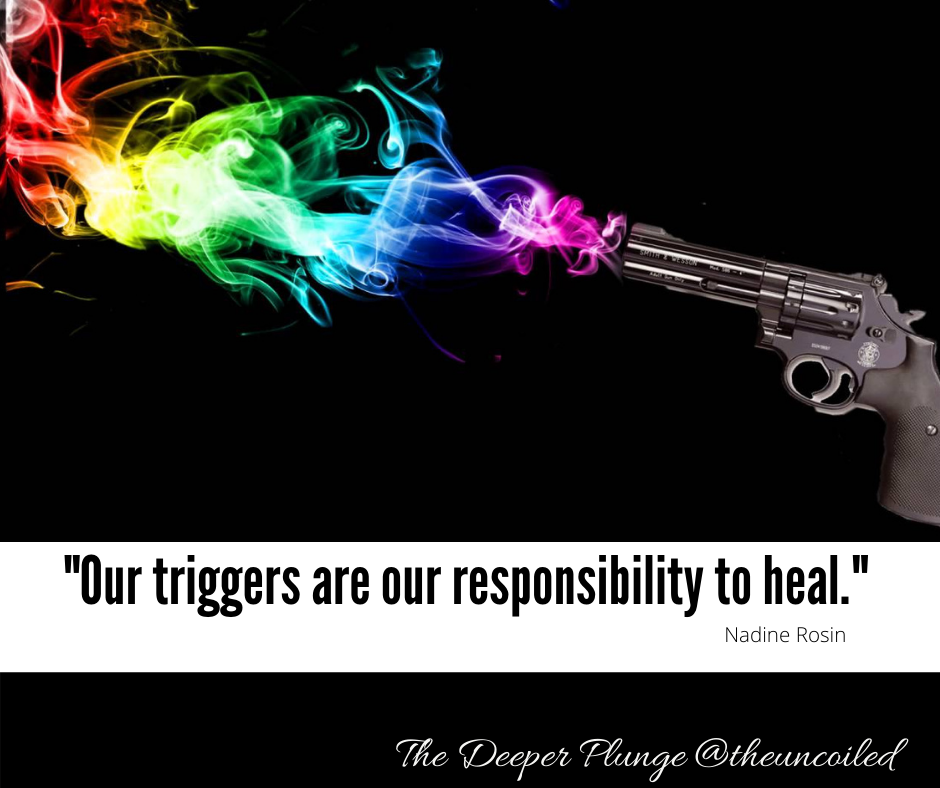Let me tell you the truth about triggers. We ALL have them. Those irritating actions and behaviors – usually of others – that just annoy the living daylights out of us. Whether it is our mother, spouse, or complete stranger that gets under our skin, there are few worse feelings, than that anger, annoyance, and shadow behavior that rears its ugly head and strikes back.
A trigger in psychological terms is a certain stimulus, often related to a real-life trauma, that affects one’s mental &/or emotional state, and negatively impacts the person. It is typically used when relating to post-traumatic stress disorder. In recent years, the term has been used more casually – referring to the experience of having an emotional reaction to an external stimulus – small or large without severe trauma attached.
We all know the feeling when we see an unknown number pop up on our screens and it is yet another cold call from some humble human being simply doing their job – which they most likely hate – but nonetheless are trying to make it through the day too. What about the cashier who is simply taking their time ringing up your purchase, because they know they are stuck behind the till for another 6 hours? We get so agitated and annoyed by complete strangers just doing what they must do to survive.
What about those closest to us? Those we share a home with – what happens when we are constantly triggered by that one family member? Do we lash out and blame or can we take a step back and look more clearly at what is really going on in the home?
If we are constantly feeling triggered, stressed, overwhelmed, and over-reacting, then we need to stop and look at how we can start healing these triggers and create conscious present moment awareness to help us overcome these feelings. Even getting your monthly bills, spending too much time alone, being judged or criticized often, feeling rejected can be the triggers that often can spiral into unbalanced and unhappy out of control lives.
Sometimes it is the smallest thing and we lash out, but that ‘small’ thing is usually never the REAL thing that has caused the pain, it is the original wounding that was either not acknowledged, allowed, processed, or healed. These types of experiences cause very uncomfortable reactions, feelings & thoughts. Triggers cause anxiety and anger and they happen in an instance and simultaneously. Hence it is so very important to develop self-awareness and mindfulness practices to help catch ourselves in that moment- before we act out and cause unnecessary pain and suffering to ourselves and others.
Here are 3 simple things you can do when you are feeling triggered and about to lash out –
1.Remove yourself from the situation if possible.
This may seem like ‘running away’ from your problems, but if the trigger is constant, and can lead to unhealthy confrontation then it is best to walk away.
2. Get real – ask the hard questions
Once you have removed yourself from the situation, you need to honestly take a moment to understand why you are triggered, can you find the root, the cause of this discomfort? Here are some starting point questions to get the process going?
Did it start at a certain point in your life, has it always been this way? Have you possibly transferred the emotion from a traumatic experience onto a seemingly unrelated person, behavior or situation?
Why do you feel the need to blame others for how you are feeling? How can you take responsibility for your own feelings and part in the narrative you are telling yourself about the trigger?
If you have suffered trauma in the past, do you feel you have sufficiently dealt with, explored, and healed from it? Or do you think this trigger and emotion can be related in any way?
3. Stay in the moment, call it what it is
If you have gotten some clarity when exploring the causes of the trigger and what it brings up in you, then take a moment to acknowledge this. This is the point where you call it what it is – this could seem insignificant but trust yourself and the process.
For example, if you are triggered and get angry when people don’t reply to your messages – look at your own emotions first – do you feel unimportant? Unloved? Invisible? Disrespected? Do you stop to consider that they may be genuinely busy and not just ignoring you on purpose with ill intent? Do you allow a gap in the narrative where reason and logic dictate the inner dialogue or do you automatically assume that you have done something wrong and this fuels your anxiety and you go on a tirade as to why they don’t want to be your friend anymore?

See how quickly our own self-talk and thoughts can trigger our emotions into a state of anxiety and perplexion.
So, in this example the trigger is being ignored, but the actual underlying issue is feeling rejected, guilty, unloved etc.…It is those emotions that need to be faced and healed. Where did those feelings begin? Was it because your parent forgot to pick you up from school one day and didn’t make a big deal out of it? Even though you internalised it as having done something wrong, so they ignored your feelings and made you feel unimportant.
Without honest self-examination and awareness, it is clear that the blame game will only get you so far, until you are forced to examine your life.
The truth about triggers is that they are our responsibility to heal.
From the silly to the serious – triggers are real, emotions are real, our lives are real and we count, we deserve to be seen and heard and healed.
*Should you suffer from PTSD or any other mental health disorder lease do seek the correct counsel immediately. If you are unsure about where to start, reach out and we will put you in touch with the correct information and resources.












